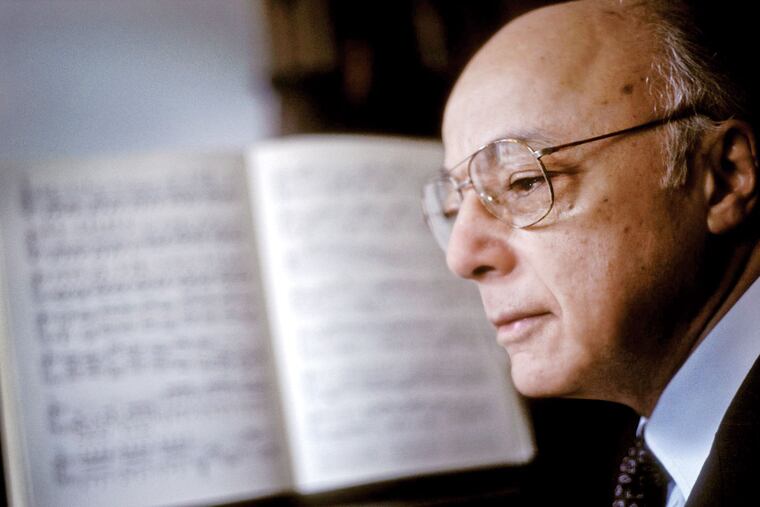Seymour Lipkin: Eminent pianist and conductor
When Seymour Lipkin auditioned at the Curtis Institute of Music in 1938, he said to his mother (as quoted in the Detroit Free Press): "This looks like a place you'd want to work in."

When Seymour Lipkin auditioned at the Curtis Institute of Music in 1938, he said to his mother (as quoted in the Detroit Free Press): "This looks like a place you'd want to work in."
Work he did - first as a student for nearly a decade, and later as a professor for more than 45 years.
Mr. Lipkin, 88, an eminent pianist and conductor, died Monday, Nov. 16, at Blue Hill Memorial Hospital in Maine.
Born in Detroit in 1927, Mr. Lipkin was sent to Philadelphia by his family to study piano at Curtis with David Saperton, Rudolf Serkin, and Mieczyslaw Horszowski. He was 11.
His school days were interrupted a few years later when word came that Jascha Heifetz was looking for a new accompanist on a USO tour of Europe. Curtis suggested the 17-year-old Mr. Lipkin. He auditioned for the famed violinist at his New York City hotel, finishing with the last movement of the Mendelssohn Concerto, which Mr. Lipkin recalled (as recounted in Curtis' history blog) Heifetz played "so fast you couldn't believe it."
Apparently not too fast for Mr. Lipkin, since Heifetz gave him the job and off to Europe they went. Before the war was out, the pair played more than 60 concerts for American troops. Mr. Lipkin returned to Curtis after V-E Day, graduating in 1947.
His piano skills firmly established, Mr. Lipkin began a two-pronged career. He studied conducting with Serge Koussevitzky at Tanglewood, and became apprentice to George Szell at the Cleveland Orchestra in 1947-48 and assistant conductor of the New York Philharmonic. He won first prize in the Rachmaninoff Piano Competition of 1948, and debuted as soloist with a string of major American orchestras. He took the podium for Bernstein's Trouble in Tahiti at New York City Opera in 1958, led the orchestra of the Joffrey Ballet in the 1960s and '70s, and was music director of the Long Island Symphony from 1963 to 1979.
As a teacher, he tended to students at Curtis (since 1969) and the Juilliard School (starting in 1986), and several other schools.
His re-arrival as a pianist in 1981 turned into a career that, in recent years, included Philadelphia Chamber Music Society recitals and ambitious recording. Chamber music partners included violinists Arnold Steinhardt, Oscar Shumsky, and Aaron Rosand, as well as violist William Primrose.
But it was perhaps as a Beethoven interpreter that he was most lauded.
"Mr. Lipkin is a tidy, energetic and engaging musician," wrote a New York Times critic of a 1999 Hunter College recital. "Beethoven as heard through his hands is a composer forthright and direct in expression, and one who works efficiently to a plan. Forms are clear: Mr. Lipkin moves through the sonatas like someone who has walked the same paths daily for years and still enjoys the turns and the views."
In 2004, his complete Beethoven sonatas were issued on Newport Classics. A complete Schubert sonata cycle followed in 2008 and 2009.
His approach to technical matters in his senior years could be breathtakingly nonchalant. He didn't even rule out legendary finger-busters such as Beethoven's Sonata No. 29 in B flat Major, Op. 106 ("Hammerklavier").
"I don't question why," he said in a 2012 Inquirer interview. "The fingers seem to be moving perfectly well, as far as I can tell, and in a way, better. The discipline and efficiency gets better as you go along."
Obviously, his playing extended far beyond the fingers. "I say to my students: At this moment, you are eight feet tall," said Mr. Lipkin. "We become the greatness of the composer we're dealing with."
Information on survivors or memorial services was not immediately available.
215-854-5611